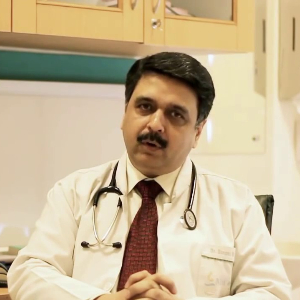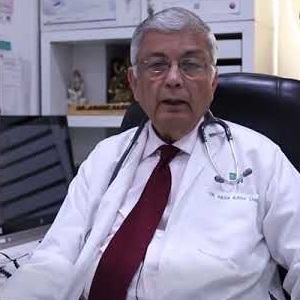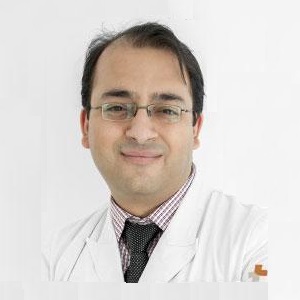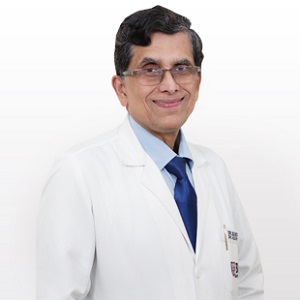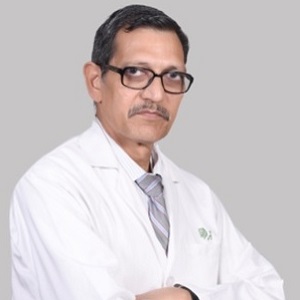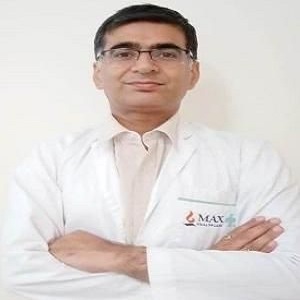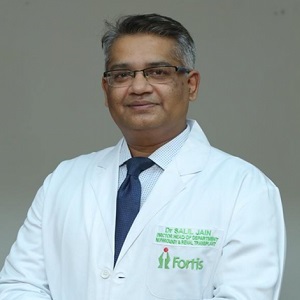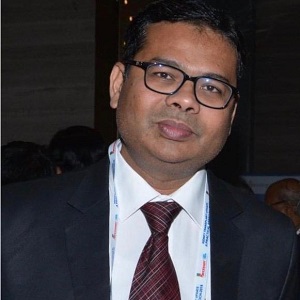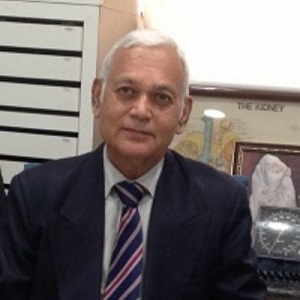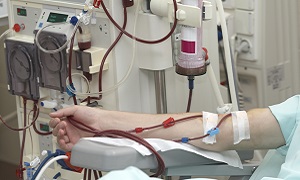Best Doctors in India for Polycystic Kidney Disease Treatment
- Top Nephrologist | Max Hospital, Saket, New Delhi, India
- 25+ Years Experience
- Max Super Specialty Hospital, Saket, New Delhi
Profile Highlights:
- Dr. Dinesh Khullar is a distinguished nephrologist and kidney transplant specialist who serves as the Chairman of the Department of Nephrology and Renal Transplant Medicine at Max Super Speciality Hospital, Saket, New Delhi.
- With over 25 years of experience in the field, Dr. Khullar is renowned for his expertise and contributions to kidney transplantation and dialysis.
- Dr. Khullar has an impressive track record with more than 5,000 successful kidney transplants, including over 1,200 performed at Max Hospital, Saket.
- He has tackled some of the most challenging cases in the field, including ABO-incompatible transplants and procedures for highly sensitized and high-risk recipients with significant co-morbidities.
- Notably, Dr. Khullar pioneered the establishment of an online hemodiafiltration unit in North India, introducing advanced dialysis technology to the region.
- Nephrologist, Gurugram, India
- Over 15 years’ experience
- Medanta-The Medicity, Gurgaon
Profile Highlights:
- Dr. Manish Jain is a leading Nephrologist and Renal Transplant Specialist in Delhi NCR, known for his exceptional work in the field of renal medicine.
- With a career spanning over two decades, Dr. Jain has made significant contributions to nephrology, renal transplantation, and dialysis.
- His dedication to the field has earned him prestigious awards, including the Fellow of Indian College of Physicians (FICP) and Fellow of Indian Society of Nephrology (FISN), in recognition of his outstanding contributions to nephrology and community service.
- Top Nephrologist Apollo Hospital, New Delhi, India
- 45+ Years Experience
- Indraprastha Apollo Hospital, New Delhi
Profile Highlights:
- Dr. Ashok Sarin is a renowned specialist in kidney diseases, dialysis, and transplantation, currently serving as a Senior Consultant in Nephrology at Indraprastha Apollo Hospital in Sarita Vihar, New Delhi.
- With over 40 years of experience at Apollo Hospital, Dr. Sarin has established himself as a leading figure in the field of nephrology.
- Dr. Ashok Sarin is renowned for his expertise in treating a wide range of kidney conditions, including kidney stones, nephrotic syndrome, polycystic kidney disease, and acute renal failure.
- As a skilled nephrologist, he excels in managing chronic kidney disease, providing comprehensive care that includes pre- and post-dialysis support, renal diet counseling, and the management of resistant hypertension.
- Nephrologist, Gurugram, India
- Over 18 years’ experience
- Medanta-The Medicity, Gurgaon
Profile Highlights:
- Dr. Sidharth Kumar Sethi is a distinguished Senior Consultant in Pediatric Nephrology and Pediatric Renal Transplant Medicine at Medanta The Medicity, Gurugram, India.
- He holds a robust educational background with an M.B.B.S., M.D. in Pediatrics, and specialized Fellowships from the International Society of Nephrology and the International Pediatric Nephrology Association.
- Dr. Sethi’s clinical expertise spans a broad spectrum of renal care, including acute kidney injury, dialysis, and pediatric renal transplantation
- Top Nephrologist | BLK Hospital, New Delhi, India
- 38+ Years Experience
- BLK Super Specialty Hospital, New Delhi
Profile Highlights:
- Currently serving as the Principal Director and Head of the Nephrology Department at BLK-Max Super Speciality Hospital in Delhi, Dr. Prakash has built a reputation for his expertise in managing acute and complex nephrological disorders.
- With over 38 years of experience in nephrology and renal transplantation, Dr. Sunil Prakash is a leading expert in the field.
- Dr. Prakash’s academic credentials are exemplary, holding an M.B.B.S., M.D. (Indian Medicine), D.M. (Nephrology), and fellowships from prestigious institutions in the USA, including FISPD and F.I.S.N.
- Top Nephrologist | Apollo Hospital, New Delhi, India
- 27+ Years Experience
- Indraprastha Apollo Hospital, New Delhi
Profile Highlights:
- Dr. D. K. Agarwal is a distinguished Nephrologist with over 27 years of experience in the field of Nephrology, specializing in Renal Transplantation, Hemodialysis, Continuous Ambulatory Peritoneal Dialysis (CAPD), and the management of complex kidney diseases.
- He is currently affiliated with Apollo Hospitals Indraprastha in New Delhi, where he has earned a reputation for his expertise in managing a wide range of kidney-related conditions.
- Dr. Agarwal has held senior consultant positions at prestigious institutions, both nationally and internationally, including Nizam’s Institute of Medical Sciences, Hyderabad, and Sanjay Gandhi Post Graduate Institute of Medical Sciences, Lucknow.
- Top Nephrologist | Max Hospital, Saket, New Delhi, India
- 20+ Years Experience
- Max Super Specialty Hospital, Saket, New Delhi
Profile Highlights:
- Dr. Rahul Grover is a leading nephrologist with over 14 years of experience in the field of nephrology and kidney transplantation.
- Currently, he serves as the Associate Director of Nephrology at Max Healthcare, where he is recognized for his expertise in treating complex renal conditions.
- His special interests include kidney transplantation, particularly in complex cases such as sensitized and ABO-incompatible transplants. Dr. Grover is also skilled in hemodialysis and Continuous Ambulatory Peritoneal Dialysis (CAPD), as well as critical care nephrology.
- Nephrologist, Gurugram, India
- Over 24 years’ experience
- Fortis Memorial Research Institute
Profile Highlights:
- Dr. Salil Jain, MBBS, MD, DNB (Nephrology), is a highly esteemed Senior Director and Head of the Department of Nephrology & Renal Transplant at Fortis Hospital, Gurgaon.
- With over 24 years of experience, Dr. Jain is recognized as one of the leading nephrologists in the Delhi and Gurgaon regions.
- His expertise spans across nephrology and organ transplant, with a special focus on kidney transplants.
- Nephrologist, Gurugram, India
- Over 20 years’ experience
- Medanta-The Medicity, Gurgaon
Profile Highlights:
- Dr. Shyam Bihari Bansal is the Senior Director and Head of the Department of Nephrology at Medanta Gurugram, where he also leads the Kidney Transplant and Renal Care programs.
- He holds an impressive array of qualifications, including an F.R.C.P., D.M. in Nephrology, M.D. in General Medicine, and an M.B.B.S.
- Dr. Bansal has a distinguished career marked by significant contributions to the field of nephrology and kidney transplantation.
- Top Nephrologist | Apollo Hospital, New Delhi, India
- 35+ Years Experience
- Indraprastha Apollo Hospital, New Delhi
Profile Highlights:
- Dr. Colonel Akhil Mishra is currently working as Sr. Consultant, Nephrology at Indraprastha Apollo Hospital, New Delhi. He is known for establishing the Department of Nephrology and Transplant at Apollo Hospital in 1995. He has more than 35 years of experience in this field.
- Prior to this he was working in the Army Medical Corps for 28 years (1965-1993), where he held the position of Senior Advisor in Medicine and Nephrology.
- Dr. Akhil Mishra is also known for conducting the First Kidney Transplant of the Indian Armed Forces at Army Hospital, Delhi in 1991.
- Dr. Mishra took pre mature retirement at the rank of Colonel in the year 1993. Subsequently, he established the Department of Nephrology in Escorts Research & Referral Hospital.
- He had been awarded the Vishisht Seva Medal by the President of India in 1980. He started the first kidney transplant in Army and Apollo Hospital, Delhi.
- Throughout his career, Dr. Akhil Mishra has been awarded Star Performer Consultant three times, at Indraprastha Apollo Hospital, Jan 2013, Sept 2014 & Jan 2015.
- Dr. Mishra has also been honored in 2013, by His Holiness the Dalai Lama for his dedicated work in the field of Kidney transplantation.
- He was also felicitated by the Indian Society of Nephrology (North Zone) with the Life Time achievement Award in Nephrology on 23rd Jan.2015 for his huge contribution to the growth of Nephrology.
Best Hospitals in India for Polycystic Kidney Disease Treatment
- City: Gurugram, India
Hospital Highlights:
- One of India’s best and largest multi-specialty hospitals, Medanta was built with the aim to bring India to the highest standards of medical care. The hospital has been providing the best medical services to its patients, since its inception, with care, commitment, and compassion.
- Equipped with 1250 beds, the hospital was founded by Dr. Naresh Trehan in the year 2009 with an aim to provide the best medical care at affordable costs. The hospital is spread across 43 acres and includes 45 operation theatres and 350 beds dedicated solely to ICU. The hospital includes over 800 doctors, and more than 22 specialty departments and has a dedicated floor for individual specialty in order to offer the best services under one roof.
- The hospital is considered one of the premier institutes in India for Cardiac Care and includes staffs and members of high caliber. The hospital has 6 distinct centers of excellence.
- City: Gurugram, India
Hospital Highlights:
- Artemis Hospital, established in 2007 in Gurugram, India, is a leading multi-specialty institution known for its excellence in patient care and advanced medical technology, offering comprehensive services across specialties like Cardiology, Oncology, Neurology, Orthopedics etc.
- Renowned for its patient-focused care, Artemis Hospital combines state-of-the-art infrastructure with a team of internationally trained doctors and surgeons, ensuring the highest standards of medical treatment.
- Accredited by JCI and NABH, Artemis Hospital meets global healthcare quality and safety standards, reflecting its commitment to providing compassionate, personalized care.
- The hospital is recognized for utilizing cutting-edge diagnostic and ther*peutic techniques, ensuring patients receive accurate diagnoses and effective treatments tailored to their needs.
- City: Chennai, India
Hospital Highlights:
- The Apollo Proton Cancer Centre in Chennai is the most sought-after private cancer hospital in India. It is an integrated facility that provides cutting-edge, all inclusive cancer treatment to patients all over the globe.
- The hospital is a part of the renowned Apollo Group which has a large network of over 74 hospitals in India and across the globe. Out of the 74 hospitals, 21 of them are cancer centres. However, Apollo Proton Cancer Centre is the only cancer hospital to have JCI accreditation.
- The Centre, which was established on the principles of excellence and expertise, unites a formidable medical staff led by some of the most illustrious figures in cancer treatment.
- The hospital follows the global ASTRO Model Policy. It is the same global policy which is followed by countries like USA, UK, and Europe.
- Apollo Proton Cancer Centre is among the very few hospitals in India to receive patients from First World countries such as USA, Canada, New Zealand, Australia, Singapore, Thailand, etc.
- Apart from that, it is also the first hospital in Chennai to receive patients from several countries like Uzbekistan, Kazakhstan, Turkmenistan, Georgia, Armenia, Azerbaijan, SAARC countries (Bangladesh, Nepal, Sri Lanka, Maldives, Bhutan, Afghanistan, and Pakistan), South Africa, Turkey, Egypt, etc.
- In fact, there is a dedicated team at the Apollo Proton Cancer Centre that serves only international patients. Thus, on a monthly basis, the Centre receives patients from across 32 countries.
- Moreover, there are certain treatments in Apollo Proton Cancer Centre that are not available in any other centre. APCC addresses all types of possible cancers that are usually not covered by any other centre.
- City: New Delhi, India
Hospital Highlights:
- Over the last 33 years, the Fortis Escorts Heart Institute has set new standards in cardiac treatment with groundbreaking research. It is now known around the world as a centre of expertise for Cardiac Bypass Surgery, Interventional Cardiology, Non-invasive Cardiology, Paediatric Cardiology, and Paediatric Cardiac Surgery.
- The hospital has cutting-edge laboratories that perform a wide range of diagnostic tests in Nuclear Medicine, Radiology, Biochemistry, Haematology, Transfusion Medicine, and Microbiology.
- Fortis Escorts Heart Institute boasts a diverse group of bright and experienced doctors who are backed up by a team of highly qualified, experienced, and devoted support professionals as well as cutting-edge equipment such as the recently installed Dual CT Scan.
- Approximately 200 cardiac doctors and 1600 personnel currently collaborate to manage over 14,500 admissions and 7,200 emergency situations each year. The hospital now has a 310-bed infrastructure, as well as five cath labs and a slew of other world-class amenities.
- City: Gurugram, India
Hospital Highlights:
- Fortis Memorial Research Institute (FMRI) is a premier multi-super-specialty, quaternary care hospital, known for its exceptional international faculty, top-tier clinicians, super-sub-specialists, and specialized nurses, all supported by cutting-edge technology.
- It is the flaship hospital of Fortis Healthcare Limited, part of IHH Healthcare Berhad, a leading integrated healthcare services provider in India. As one of the country’s largest healthcare organizations, Fortis operates 28 healthcare facilities with over 4,500 operational beds (including O&M facilities) and more than 400 diagnostic centers (including joint ventures).
- Recognized as one of the top hospitals in India, FMRI serves as a leading referral center and aspires to be the ‘Mecca of Healthcare’ for India and beyond. Its 11-acre campus is a testament to its commitment to providing world-class healthcare.
- Accredited by JCI and NABH, FMRI is dedicated to maintaining the highest standards of healthcare quality and safety, ensuring that every patient receives the best possible care. The hospital’s reputation is further enhanced by its state-of-the-art facilities and innovative medical practices.
- City: New Delhi, India
Hospital Highlights:
- The Indian Spinal Injuries Center (ISIC), provides state-of-the-art facilities for the management of all types of spinal ailments.
- Staffed with internationally trained, acclaimed, and dedicated spine surgeons, the hospital provides cutting-edge medical & surgical technology. The hospital provides comprehensive management of spinal injury, back pain, spinal deformities, tumors, osteoporosis, etc.
- The hospital performs motion-preserving spine surgeries including disc replacement and dynamic fixation, and minimally invasive spine surgeries such as endoscopic disc excision.
- The orthopedic service of the hospital covers all orthopedic ailments including trauma, joint diseases & replacements, oncology, pediatric orthopedics & upper limb ailment.
- City: Faridabad
Hospital Highlights:
In the sprawling city of Faridabad, where healthcare needs are diverse and ever-evolving, one institution has consistently stood out as a beacon of excellence in the field of medicine—Marengo Asia Hospital. Established with a vision to provide world-class healthcare services to the community it serves, Marengo Asia Hospital has emerged as a trusted name synonymous with quality, compassion, and innovation in healthcare.
- City: New Delhi, India
Hospital Highlights:
- Indraprastha Apollo Hospital is a 700-bedded multispecialty hospital in the heart of the capital of India. It is a part of Apollo Hospital group, one of India’s most reputed healthcare chains. Indraprastha Apollo Hospital has been accredited by Joint Commission International, making it the first internationally accredited hospital in the country in 2005.
- There are 52 specialties in the hospital with one of the best cardiology centers in the country. The hospital is also equipped with State of the art infrastructure facilities with the largest Sleep Lab in Asia and the largest number of ICU bed facilities in India.
- The latest and highly advanced technologies that are installed in the hospital include Da Vinci Robotic Surgery System, PET-MR, PET-CT, Cobalt-based HDR, Brain Lab Navigation System, Tilting MRI, Portable CT scanner, 3 Tesla MRI, 128 Slice CT scanner, DSA Lab, Endosonography, Hyperbaric Chamber and Fibro scan.
- City: New Delhi, India
Hospital Highlights:
- One of the well-regarded providers in India committed to the highest standards of clinical excellence and patient care, Max Super Specialty Hospital is a part of Max Healthcare, which is the second-largest healthcare chain in India. Regarded as one of the most well-regarded healthcare providers in the country, Max Super Specialty Hospital is committed to the highest standards of clinical excellence as well as patient care. The hospital is also equipped with the latest technology as well as cutting-edge research. The hospital is known to deliver and ensure the highest level of patient care.
- The hospital has more than 500 beds and offers treatment for over 35 specialties. The hospital also holds the credit of having installed the first Brain Suite in Asia. This is a highly advanced Neurosurgical machine that allows MRI to be taken while surgery is ongoing.
- Other advanced and latest technologies are also installed in the hospital such as the 1.5 Tesla MRI machine, 64 Slice CT Angiography, 4D ECHO, LINAC, and 3.5T MRI machine.
- City: Kolkata, India
Hospital Highlights:
- Founded in 2017, the HCG EKO Cancer Centre is a committed, all-inclusive cancer care facility in Kolkata.
- The hospital was collaboratively established by India’s leading cancer care provider HCG (HealthCare Global Enterprises Ltd.), and EKO Diagnostic Pvt. Ltd., a top diagnostic and imaging chain in Eastern India.
- With 88 beds, the hospital provides a full spectrum of services including diagnosis, prevention, screening, second opinions, treatment, rehabilitation, follow-up, and palliative care.
- Additionally, the hospital contains a day-care chemotherapy ward, Neutropenic ward, medical ICU, pharmacy, blood bank, and an IPD wing.
- At HCG EKO Cancer Centre Kolkata, a large team of cancer experts with experience in medical oncology, surgical oncology, radiation oncology, hemato oncology, BMT, and nuclear medicine collaborate to offer a variety of treatment options under one roof.
- Furthermore, the hospital is also known for employing the most advanced radiation technology such as, the Radixact, a next-generation TomoTherapy equipment that provides greater radiation delivery precision.
Polycystic Kidney Disease
Symptoms
In many cases, people can live with PKD for years, without experience any signs and symptoms, which are associated with the disease. A cyst typically needs to grow half an inch or larger before you might be able to notice any symptom of the disease.
Some of the symptoms of this ailment include:
- Blood in the urine
- Frequent urination
- Pain or heaviness in the back
- Pain or tenderness in the abdomen
- Skin that bruises easily
- Fatigue
- Pale skin color
- Pain in the sides
- Urinary tract infection
- Kidney stones
- Joint pain
- Nail abnormalities
If you notice yourself or anyone close to you, develop any signs or symptoms of polycystic kidney disease, then it is best to see your doctor as soon as possible.
Types & Causes
Polycystic kidney disease is generally inherited. Although, in a few cases, it may develop in people having other serious kidney problems. The three main types of PKD include:
Autosomal Dominant PKD (ADPKD)- Autosomal dominant PKD, which is also termed adult PKD, accounts for around 90 percent of the cases. People having a parent with PKD has a 50 percent chance of developing this condition.
Symptoms generally occur later in life, between the ages of 30 and 40, though few people can begin to experience symptoms in childhood as well.
Autosomal Recessive PKD (ARPKD)- Autosomal Recessive PKD is much less common as compared to ADPKD. It is also inherited, but to develop ARPKD, both parents must carry the gene for the disease.
Carriers of ARPKD won’t show any symptoms if they have only one gene. However, they will have ARPKD if they inherit two genes from each parent. Four types of ARPKD exist, which include:
- Prenatal form, which is present at birth.
- Neonatal form can occur within the first month after birth.
- Infantile form can occur when a child is 3 to 12 months old.
- Juvenile form can occur after a child is 1 year old.
Acquired cystic kidney disease- Acquired cystic kidney disease (ACKD) is not inherited and it generally occurs at a later stage in life.
This condition is generally seen in people who are already having other kidney problems. It is more common among people having kidney failure and people who are on dialysis.
Diagnosis
Since ADPKD and ARPKD are inherited, the doctor will first need to review your family history. They might initially need to order a complete blood count in order to look for anemia or any other signs of infections.
To diagnose all three types of PKD, your doctor can use imaging tests to look for cysts of the kidney, liver, and other organs. Imaging tests that are used to diagnose PKD include:
Abdominal Ultrasound
Abdominal CT scan
Abdominal MRI scan
Intravenous Pyelogram
Treatment
The severity of this condition can vary from person to person, even among the members of the same family. Generally, treating polycystic kidney diseases involves treating the signs, symptoms, and complications in the early stages.
Kidney Cyst Growth
Pain
Declining Kidney Function
High blood pressure
Blood in the urine
Bladder or kidney infections
Kidney failure
Aneurysms
If you are suffering from polycystic kidney disease and a family history of ruptured brain aneurysms, then your doctor might recommend regular screening for intracranial aneurysms.
If an aneurysm is discovered, then surgical clipping of the aneurysm to reduce the risk of bleeding may be an option, depending on its size. There are non-surgical treatment options as well, such as controlling high blood pressure, and high blood cholesterol. Quitting smoking is also quite beneficial.
Complications
Several complications are associated with polycystic kidney disease. They include the following:
- High blood pressure- A common complication of polycystic kidney disease is elevated blood pressure. If high blood pressure is untreated, it can cause further damage to your kidneys and may increase the risk of heart disease or stroke.
- Chronic pain- Pain is another common symptom among people with polycystic kidney disease. It generally occurs in your side or back. It is also possible that the pain is associated with a urinary tract infection, a kidney stone, or a malignancy.
- Loss of kidney function- A progressive loss of kidney function is known to be one of the most serious complications of polycystic kidney disease. Nearly half of the patients suffering from PKD have kidney failure by the age of 60. This happens because PKD can interfere with your kidneys’ ability to keep wastes from building to toxic levels. As the disease worsens, end-stage kidney disease may occur, which can require you to undergo dialysis or a transplant.
- Growth of cysts in the liver- If you are having polycystic kidney disease, then you are more likely to develop liver cysts, as your age increases. While both men and women develop cysts, cysts in women are often larger. Female hormones and multiple pregnancies can also contribute to liver cysts.
- Heart valve abnormalities- Around 25 percent of adults with polycystic kidney disease develop mitral valve prolapse. When this happens, the heart valve no longer closes properly, and this can allow blood to leak backward.
- Development of an aneurysm in the brain- A balloon-like bulge in a blood vessel in your brain can cause bleeding i.e. hemorrhage if it ruptures. People suffering from polycystic kidney disease usually have a higher risk of aneurysms. People with a family history of aneurysms are at the highest risk. You can talk to your doctor to ask if screening is needed in your case.
- Pregnancy complications- Most women having polycystic kidney disease are generally able to have a successful pregnancy. However, in some cases, women can develop preeclampsia, a life-threatening disorder. Those having high blood pressure or a decline in kidney function are more likely to develop it.
- Colon problems- Weaknesses and pouches or sacs in the wall of the colon i.e. diverticulosis can also develop in people who are having polycystic kidney disease.
Prevention
One of the best ways to prevent some of the complications of PKD is to keep your kidneys as healthy as you can.
Some of the tips to keep your blood pressure in check include eating a diet low in salt, and containing plenty of fruits and vegetables, exercising regularly and maintaining a healthy weight, quitting smoking, and reducing alcohol consumption.

